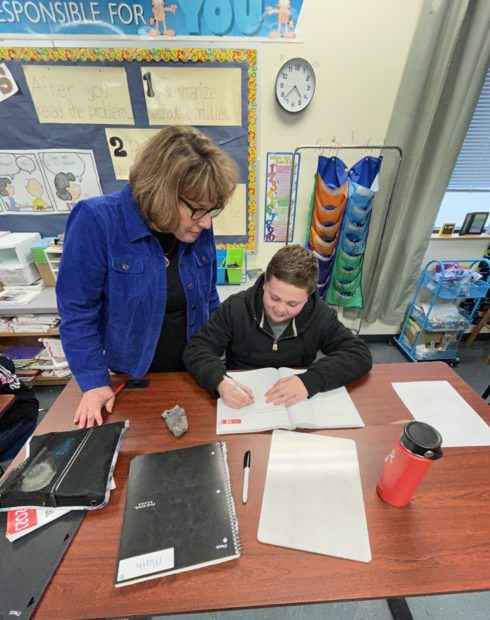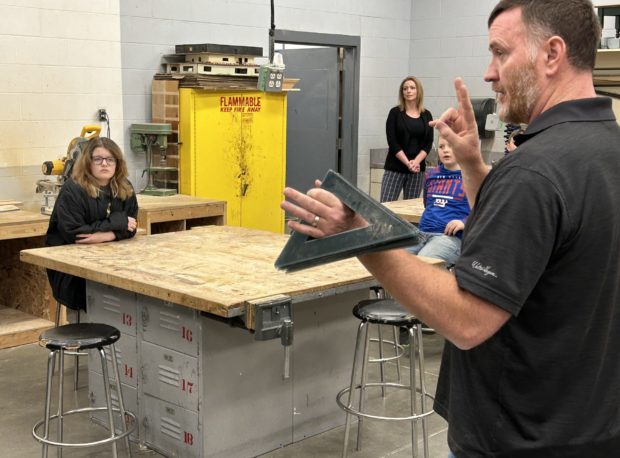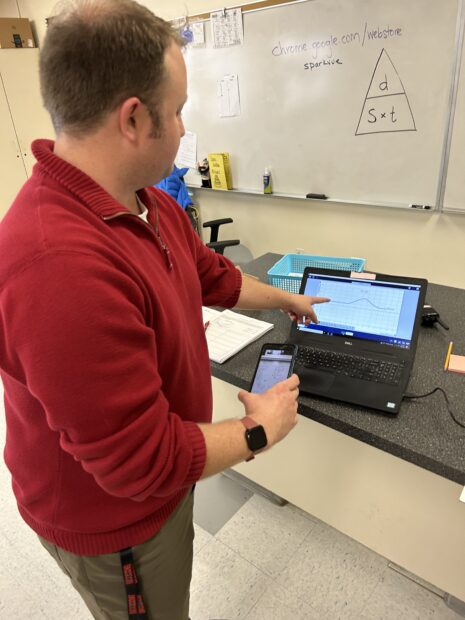When a school is recognized as one of the worst in Idaho, some educators might clamor for excuses or deflect blame: “we don’t have the resources” or “our students come from families with high poverty.”
That’s not the case at Gooding Middle School. The close-knit community of 20 teachers rallied with a single purpose — education is the most important job in the world.
In the span of four years, Gooding’s test scores went from one of the worst performing in Idaho — 19% proficient in math and 29% in English language arts — to one of the highest achieving for underserved schools.
And the state took notice. State officials invited the administration to a meeting last year to find out how Gooding teachers achieved the notable turnaround: 20% growth in math and 25.7% growth in ELA.
“To be a little rural school and to have the state of Idaho recognize what we’re doing out here is nice,” said Chelynne Scott, the school’s principal.
From her office behind the small reception counter where two staff members offered a friendly wave, Scott spoke about academic interventions, and school improvement efforts and helpful grant funds.
But this accomplishment, she said, is the result of her remarkable staff members who, embarrassed by testing at the bottom 5% of schools, accepted accountability and embraced change.

“They focus on what we can control,” Scott said. “All of us have to own this.”
As a rural and underserved Title I school, Gooding serves a high percentage of low income and minority families. Thirty-eight percent are Hispanic and 34% of the students receive free or reduced lunch, a measure of poverty. The school serves 332 students in grades 6-8.
Sitting at the crossroads of cornfields and cattle pastures, the rural town of Gooding lacks economic opportunities. The big three employers, Scott said, are farming and dairies, the hospital and the school district.
The downtown is typical of a small, rural community. Main Street includes three or four blocks of storefronts. There’s a pharmacy, an insurance agent, a few gas stations, motels, two or three Mexican restaurants, and a handful of shuttered businesses.
The aging houses set back from the street that leads to the middle school stand in contrast to the energy of this “special building,” as Scott describes it.
Four years of growth
In 2018, Gooding was identified by the State Board of Education as one of 29 Idaho schools in the bottom 5% for performance. The state sent help in the form of a capacity builder to design and implement interventions. Capacity builders are funded by the State Department of Education’s Idaho Building Capacity Project, a professional development grant program that supports underperforming schools.
“So we had an amazing one,” Scott recalled. “She was a former middle school math teacher, and she was the one who taught us all about data and why it’s important.”
For four years, Dana DeHaan drove from Twin Falls to help teachers interpret testing data and how to respond in the classroom. They embrace testing now because they’re “assessment literate,” Scott said.
DeHaan’s mentorship helped the school obtain steady, year-over-year growth on Idaho’s standardized tests, the ISAT.
ISAT Math Growth Performance
- 2019 – 7%
- 2020 – COVID
- 2021 – 9%
- 2022 – 4%
ISAT ELA Growth Performance
- 2019 – 11%
- 2020 – COVID
- 2021 – 6.7%
- 2022 – 8%
“When you give a kid any assessment, what are you doing with that information when it’s done? Are you just recording it in a gradebook? Or are you looking at the story the data is telling you and then responding to that?” Scott asked.
Gooding teachers respond by reteaching content or developing remediation strategies.
In ELA, two strategies are “close reading” across content areas — even shop class — and “brief writes” concentrating on paragraph development; in math, they use intervention labs with concentration boards: on a daily basis they re-create and practice those problems students miss the most.

Dedicated to their middle school
Like many on her staff, Scott is a longtime member of the school community — 18 years between the high school and middle school. She took over as principal in 2019.
Scott downplayed her role, stressing that her like-minded staff deserves the credit because they embraced a shift in culture.
“Gooding Middle School’s teachers (were) very engaged and creative with their ideas for instructional improvements. I found them professional and committed from the very beginning,” recalled DeHaan.
To emphasize the strength of their bond, Scott recalled an incident when a math teacher who was commuting from Boise couldn’t find rental housing. Unwilling to leave the job, he considered sleeping in his car, which was something Scott couldn’t allow. So another teacher stepped in and provided a place to stay.

“This staff really likes each other,” Scott said. “There’s a level of security and comfort found here.”
That strong bond impacted the academic lives of hundreds of young people who are preparing for high school and thinking about their future.
Having student performance achieve the state average might not sound significant, but considering how much progress Gooding students have made in the last four years, these teachers are going to celebrate, because it means they are no longer one of the worst schools in Idaho.
